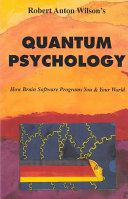Quantum Psychology : How Brain Software Programs You and Your World (1990), p. 45
Context: Obviously, the faster we process information, the more rich and complex our models or glosses — our reality-tunnels — will become.
Resistance to new information, however, has a strong neurological foundation in all animals, as indicated by studies of imprinting and conditioning. Most animals, including most domesticated primates (humans) show a truly staggering ability to "ignore" certain kinds of information — that which does not "fit" their imprinted/conditioned reality-tunnel. We generally call this "conservatism" or "stupidity", but it appears in all parts of the political spectrum, and in learned societies as well as in the Ku Klux Klan.
Quotes from book
Quantum Psychology

Quantum Psychology: How Brain Software Programs You & Your World is a book written by Robert Anton Wilson, originally published in 1990. It deals with the subject of quantum psychology, an area Wilson often wrote about.Some consider Quantum Psychology a follow-up to Wilson's earlier volume Prometheus Rising, mainly for the presence of practical exercises to demonstrate its concepts at the end of each chapter . It focuses primarily on the metaphysical and epistemological problems of Aristotelean reasoning and its use in everyday language, covering E-Prime and how it addresses many of the semantic "spooks" that common language lets in.
Quantum Psychology : How Brain Software Programs You and Your World (1990), p. 45
Context: Obviously, the faster we process information, the more rich and complex our models or glosses — our reality-tunnels — will become.
Resistance to new information, however, has a strong neurological foundation in all animals, as indicated by studies of imprinting and conditioning. Most animals, including most domesticated primates (humans) show a truly staggering ability to "ignore" certain kinds of information — that which does not "fit" their imprinted/conditioned reality-tunnel. We generally call this "conservatism" or "stupidity", but it appears in all parts of the political spectrum, and in learned societies as well as in the Ku Klux Klan.